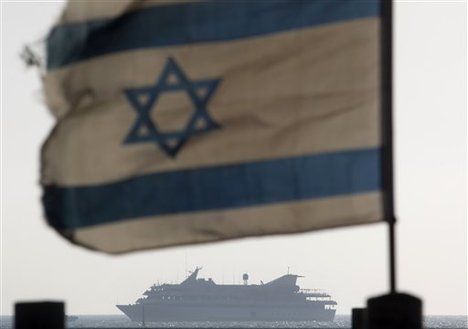UPDATES
AIJAC UPDATE – How the 2011 flotilla flopped/The controversial “anti-boycott” law
July 15, 2011

AIJAC’s latest email Update looks at why and how the 2011 Gaza flotilla gambit fizzled out. In contrast to 2010’s headline-grabbing political stunt that acted as a Trojan Horse for the Turkish Islamist IHH charity resulting in needless deaths and injuries, this was no replay.
First up, political analyst Emanuele Ottolenghi from the Foundation for Defence of Democracies, looks at the changed regional circumstances that saw the Turkish Government prevent the IHH from participating, revealing even more sharply how the first flotilla was a political contrivance to a large extent of Ankara’s making. Ottolenghi also looks at the role played by the UN Secretary General Ban Ki Moon and Greece in stymieing the flotilla’s fortunes. To read this article, CLICK HERE.
Next, Michael Ross looks at the rumoured contents of the much delayed report from the UN inquiry led by former New Zealand PM Sir Geoffrey Palmer, into the 2010 Gaza flotilla. Details of the report have been leaking out since May and all the signs indicate that the report backs the legality of Israel’s Gaza blockade, commends Israel’s own investigation but faults Turkey’s, and does not demand that Israel apologise to Turkey or pay any kind of reparation. Even where the report does criticise Israel, Ross writes, that, for a “UN Report it constitutes a very mild slap on the wrist”. To read this important analysis of a report that might embarrass the Turkish Government if it is released, CLICK HERE.
Finally, this week’s “anti-boycott” law passed by Israel’s Knesset, which would allow citizens to bring civil suits against persons or organisations that call for economic, cultural or academic boycotts of Israel, Israeli institutions or regions under Israeli control, has caused some controversy. The Britain Israel Communications & Research Centre (BICOM) explains the effect of the law, the background and context, including the sense of injustice felt within Israel at unfair international campaigns seeking to isolate it, the reaction within Israel to the law, and the distinct possibility that it will not survive a Supreme Court challenge. To sort the wheat from the chaff on this controversial law, CLICK HERE.
Readers may also be interested in:
- Former Spanish PM Jose Maria Aznar, on behalf of the Friends of Israel Initiative, looks at why the unilateral declaration of a Palestinian state, and its international recognition, would be a huge mistake.
- New York’s Supreme Court has ruled that a lawsuit filed by the Israel Law Centre on behalf of a group of 84 Israeli terror victims against the Bank of China for passing on funds to Hamas can proceed.
- The Israel Project’s Alan Elsner suggests that rockets fired from Gaza into Israel this week could indicate the faltering Fatah-Hamas reconciliation drive is now defunct.
- Elliot Abrams ponders why there is so much objection to Israel being a Jewish state when so many Muslim majority states are Islamic, either by name or law.
- Jonathan Spyer explains how the formation of a cabinet in Lebanon represents a victory for the Iran-led coalition.
- For those who missed it, Australian Foreign Minister Kevin Rudd joins Labor MP Michael Danby for hot chocolate at Max Brenner to demonstrate his objection to the boycotting of Jewish businesses, here and here.
- Lawyer Elihu Stone puts the case for the “anti-boycott” law.
Recent items posted on AIJAC’s Fresh Air blog:
- A link to an ABC Radio interview with Sharon Rosen and Suheir Rasul from the Jerusalem offices of a peace initiative called Search for Common Ground.
- Former Lebanese PM Saad Hariri blames Hezbollah’s weapons for his country’s woes.
- Palestinian Authority authorised school textbooks are still filled with antisemitism and Holocaust denial.
- The Victorian Government has launched an investigation into increased racist activity in the state.
Tags: Anti-Zionism





